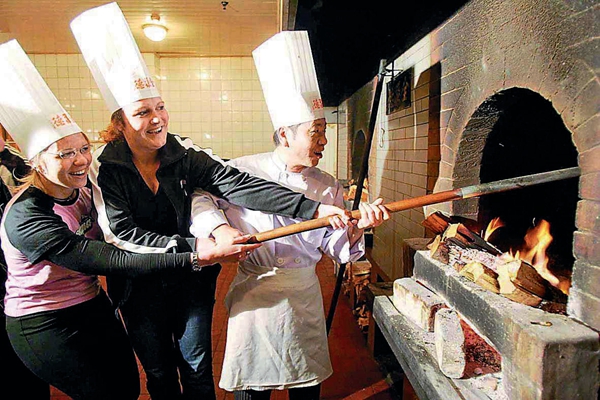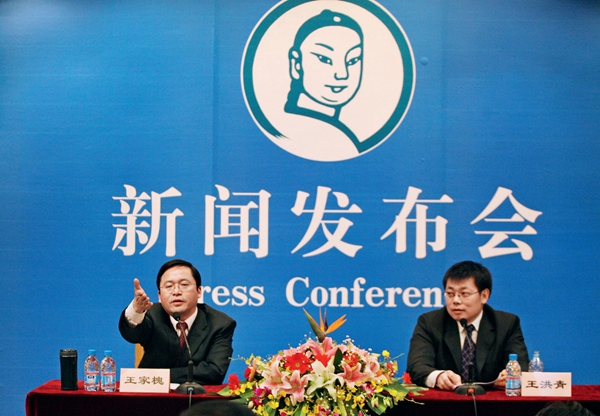By CHEN JIN
By CHEN JIN
CHINA’S sweeping internationalization of its industrial enterprises, e-commerce businesses, and technologies has infused the global consumer landscape with Chinese elements. Time-honored brands are proactive in the overarching innovation that characterizes the country’s “going global” drive.
Wanglaoji Goes Global
On New Year’s Day 2017, China Central Television broadcast a documentary on the highly-esteemed Wanglaoji brand of medicinal herbal tea. The program recalled how, 188 years ago, the company formulated the product which has since soothed the ailments of millions. Thanks to the brand’s long tradition and consistent research and development, this refreshing and therapeutic remedy is a household staple both in China and abroad.

This national leading brand has grasped the opportunities the Belt and Road Initiative offers to explore foreign markets, establish international standards applicable to the drink, and popularize Chinese tea culture.
Wanglaoji commissioned Nobel Prize laureate Dr. Ferid Murad and joined hands with Swiss company SGS in a research project on formulating an international standard for Chinese herbal tea. This created a solid foundation for the internationalization of this Chinese drink.
On January 9, 2017, the National Science and Technology Awards Conference awarded the second prize for scientific and technological progress to Wang-laoji for its DNA barcoding of Chinese medicinal plants. This marked the first scientific award ever endowed on the Chinese herbal tea industry. Wanglaoji’s innovative quality control consists in an international advanced DNA barcode verifying the beverage’s raw materials and identifying its genetic ingredients. Applicable to the production line and the production process as a whole, it guarantees the high quality of Wanglaoji products, so promoting consumer confidence and satisfaction.
Wanglaoji representatives attended the Davos Forums in 2015 and 2016. And on New Year’s Day of 2016, a Wang-laoji advertisement appeared on the Times Square big screen in New York. Its products are now available in more than 60 countries and regions worldwide.
Safeguarding Intellectual Property
Traditional Chinese brands are embedded in Chinese culture, but the road to internationalization does not run smooth. Li Qi, president of Beijing Yi-qing Food Group, believes that success overseas pivots on innovations that cater to local consumer preferences while simultaneously highlighting the Chinese essence of these products.
Food security is of universal concern, and a fundamental indicator of familial wellbeing. Talking about the counterfeit Arctic Ocean, a traditional Beijing soda brand, avaliable on the market, Li Qi observed: “All these well-established trademarks have passed the test of time, and their success is owed to the efforts of several generations. This is why it is so important to preserve hard-earned quality and stamp out counterfeiting.”

In recent years, many traditional brands have “gone global,” but few have engaged in international business without mishaps. Registration of intellectual property rights is a main stumbling block. Some firms – Wangzhihe fermented bean curd in Germany, Tsingtao Beer in the United States, Tong Ren Tang pharmaceuticals and Nü’erhong and Dukang alcoholic beverages in Japan – have fallen victim to the preemptive registration, or “cybersquatting” of their brand names.
“The development of the domestic market and the growing willingness of Chinese brands to go abroad make imperative the protection of their intellectual property and the capacity to take decisive actions should they become victims of piracy,” Secretary General of the Traditional Trademarks Working Committee of the China General Chamber of Commerce Zhang Jian said.
Ma Yide, vice chairman of the Intellectual Property Law Association, advises well-established Chinese brands to cultivate higher awareness of intellectual property rights protection, and to register their trademarks in foreign markets. Only then will they have the capacity to institute legal proceedings in the event of preemptive registration of their brands. They can then defend their rights and interests and reclaim their trademarks.
Above all, brands seeking to internationalize must innovate in order to compete in these new markets.
Leveraging the Belt and Road Initiative
“The challenge is two-fold: satisfying the appetite of foreign customers on the one hand, and tempting them to sample Chinese food culture on the other,” General Manager of Quanjude Xing Ying said, when explaining the foreign strategy of this venerable Peking roast duck brand.
The first Quanjude restaurant was founded in 1864, but the Quanjude Group was not established until 1993. It has since pursued a strategy of systematic overseas development, and opened five overseas franchises. Xing emphasized the importance of maintaining quality control, and hence the brand’s reputation, in its bid to go global. Quanjude, he said, must ensure it can fulfill the three fundamental requirements of its overseas concerns: raw material supply, work visas for skilled employees, and supervision of its restaurant franchises. The company has considered various solutions, including local suppliers, training Peking roast duck chefs for its overseas partners, and sending Chinese staff to give pre-opening consultations.
The popularity of its franchises in Tokyo and Melbourne proves that Chinese cuisine appeals to both native citizens and overseas Chinese residents of these countries. From a broader perspective, overseas opportunities exist for all famous Chinese cooking brands due to growing international exchanges and the broader acquaintance overseas with Chinese food culture.
“Our company has targeted certain priority countries, and is stepping up its internationalization,” Xing said. “We launched this year a franchise development plan by sending company representatives to North America to carry out market research and seek out partners. Our company has also made contacts with potential partners in Europe.”
Consolidation of its domestic market also spurs the company’s internationalization. From going public to its progression from catering and agri-food chains to professional operations, the company is experiencing a new lease of life as its longstanding tradition embraces innovation. “Quanjude’s goal is to upgrade its image from a traditional enterprise to a modern commercial brand that carries considerable clout on the market,” Xing said.
With the support of the Beijing Municipal Trade Commission, the Beijing Time-honored Brand Association supports traditional brand companies’ implementation of the “Internet Plus” plan to promote marketing capacity. Sixty-nine different companies are involved in the plan.
The Baihua Honey brand, founded in 1919, exemplifies the success of the innovative approach. The Ministry of Commerce named Baihua a China time-honored brand in 2006. The company teamed up with an e-marketing specialist to sell its products online, and the two entities cooperated towards innovation and developing new mechanisms. Baihua honey is now the sole time-honored brand to have won the Ministry of Commerce national model e-commerce enterprise award.
China launched the Belt and Road Initiative to promote international cooperation. This is an opportunity that General Manager of Beijing Ershang Food Group Wang Jiahuai believes must be seized. Over the past two decades, the group has focused on promoting such traditional brands as Wangzhihe fermented bean curd. This imperial dish, which originated in the Qing Dynasty (1644-1911), has become an essential feature of Chinese cuisine. In 2000, Wangzhihe went global, first launching in the United States and then in other countries. Today, this brand has been registered in 43 countries and regions globally.
Mr. Wang confirmed that exports of the brand are mainly geared to the overseas Chinese market. Thanks to the Belt and Road Initiative, and the subsequent increase in Chinese people venturing abroad, the potential of these traditional Chinese brands is expected to surge. Now available in about 20 countries, overseas sales of Wangzhihe fermented bean curd increase yearly.
Mr. Wang is nevertheless emphatic about the need to improve these brands. One upcoming innovation is the launch of a low-salt line, with a six percent to 10 percent salt content, and also a disposable container. “We cannot rely solely on our seniority to succeed. To expand our foreign markets we must innovate in order to adapt to diversified needs.”